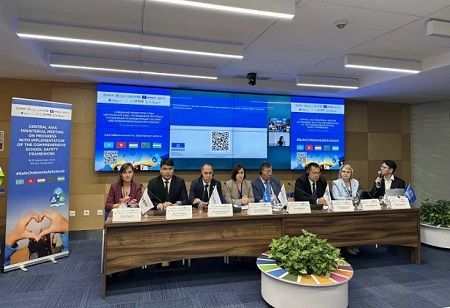This week, Kazakhstan hosted a two-day ministerial meeting in Almaty, attended by representatives from Kazakhstan, Kyrgyzstan, Tajikistan, Turkmenistan, and Uzbekistan, to reaffirm their commitment to ensuring safe and resilient schools for children. The meeting, co-organized by UNICEF, UNESCO, the UN Office for Disaster Risk Reduction (UNDRR), the Government of Japan, and the World Bank, gathered high-level government officials, development partners, and education experts to acknowledge the progress made in implementing the Comprehensive Safe Schools Framework (CSSF) 2022-2030 in Central Asia.
Participants shared best practices and explored coordinated efforts to protect children and educational institutions from disasters and climate risks. “Schools should provide safe learning environments where children are protected from risks and disasters”, said Dr. Rashed Mustafa Sarwar, UNICEF Representative in Kazakhstan.
“This meeting is an opportunity for countries to reaffirm their commitment to safeguarding children’s education and to promote a culture of safety and resilience in the education sector”. Central Asian countries face hazards including earthquakes, floods, and extreme weather events, which threaten children’s safety and continuous access to education.
Many schools in the region are located in disaster-prone areas and have structural vulnerabilities that put them at considerable risk. The CSSF offers strategic guidance to governments and partners to improve school safety, ensuring safe, equitable, and uninterrupted access to quality education for everyone.
During the meeting, participants reviewed progress in school safety and resilience in education, discussed necessary improvements in legislation and policies, and promoted climate and disaster risk education. They advocated for increased investments to strengthen school infrastructure and encourage collaboration among Central Asian countries to address common challenges.
Taking place a month before the International Day for Disaster Risk Reduction, all participating countries expressed a renewed commitment to implementing the CSSF, the Sendai Framework for Disaster Risk Reduction 2015-2030, and the Sustainable Development Goals (SDGs) for 2030. Stakeholders will collaborate to establish safer and more sustainable educational environments capable of withstanding both natural and man-made disasters.

